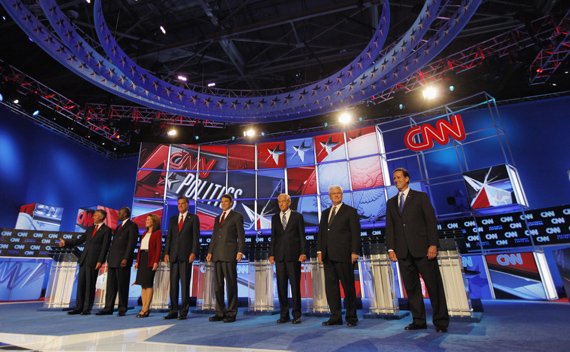GOP Presidential Debate: Perry Chooses on Afghanistan
More on:

Last night’s GOP presidential debate went about as expected. Social security topped the list of issues discussed. A once surging, now sagging Michele Bachmann trained her rhetorical fire on the new front-runner, Rick Perry. Former front-runner Mitt Romney threw his own jabs at the Texas governor where he could. And foreign policy continued in its role as the forgotten stepchild, getting mentioned only at the tail end of the debate.
But diehard foreign policy fans who skipped the Patriots-Dolphins game, the Miss Universe contest, and the three-hour finale of Bachelor Pad were rewarded for their commitment with some actual news. No, it was not when Newt Gingrich said Mexico is in a civil war. (The drug violence in Mexico is horrific, but it falls well short of a civil war.) It wasn’t when Rick Santorum and Ron Paul rehashed their exchange from last month’s debate over the relative merits of an assertive internationalist foreign policy and a non-interventionist one. (Paul might want to reconsider the wisdom of using a Tea Party-sponsored debate to explain al-Qaeda anger at U.S. foreign policy.) And it wasn’t when Jon Huntsman answered a question from an Afghan refugee about what he would "do to secure safety and protection for the women and the children of Afghanistan" by saying that the Afghan people would be helped when America rebounds to "shine brightly for liberty, democracy, human rights, and free markets." (I agree with Huntsman on Afghanistan, but the consequences of a U.S. withdrawal for Afghan women can’t be sugarcoated; they will be terrible.)
No, the news came when moderator Wolf Blitzer asked Perry whether "$2 billion a week, is that money well spent by U.S. taxpayers in Afghanistan?" Previously, Perry had avoided saying anything specific on U.S. Afghan policy. Not anymore:
Well, I agree with Governor Huntsman when we talk about it’s time to bring our young men and women home and as soon and obviously as safely as we can. But it’s also really important for us to continue to have a presence there. And I think the entire conversation about, how do we deliver our aid to those countries, and is it best spent with 100,000 military who have the target on their back in Afghanistan, I don’t think so at this particular point in time.I think the best way for us to be able to impact that country is to make a transition to where that country’s military is going to be taking care of their people, bring our young men and women home, and continue to help them build the infrastructure that we need, whether it’s schools for young women like yourself or otherwise.
Did Blitzer respond to this startling piece of news by asking a follow-up question of Perry or probing Romney for his views? No. He went to a commercial break. When the debate resumed, the first question Blitzer asked was: what “would you bring to the White House if you were the next president of the United States? An example, President George H. W. Bush put in a horseshoe pit.” Not quite the hard hitting query that us foreign policy junkies were expecting.
What should we make of Perry’s brief response? At a minimum, he is embracing President Obama’s plan to gradually reduce the U.S. commitment in Afghanistan. He may, like Huntsman, want a faster withdrawal than Obama plans.
Either way, we haven’t heard the last of these comments. They will certainly alienate the gung-ho caucus that wants to stay the course in Afghanistan. They lit into Romney after he said in a June debate that it was up to the Afghans to preserve their independence. Santorum has already accused Huntsman and Paul for embracing "a very isolationist view" for their positions on Afghanistan. He may take Perry to task as well at the next debate, which is scheduled to be held on September 22 in Orlando.
Should Perry draw criticism for his comments, don’t expect him to go the standard Washington route and issue a clarification of his remarks. As his reaction to criticism of his comments on Ben Bernanke and Social Security show, it’s not his style.
So stay tuned.
Any other foreign policy news at the debate that I missed?
More on:
 Online Store
Online Store
